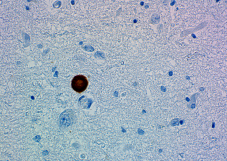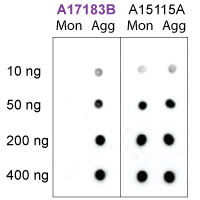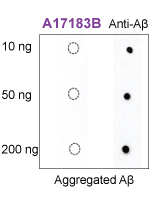 |
Mounting evidence suggests that α-Synuclein accumulation in the enteric nervous system can precede neurodegeneration in the brain. These findings invite fresh perspectives on the origins and pathogenesis of Parkinson’s disease, which may involve the gut immune system and potentially the microbiome. Take a multi-system approach to solving Parkinson’s disease with BioLegend’s trusted reagents for neuroscience and immunology. Adapted from Perez-Pardo et al. 2017, Eur J Pharmacol. PMID: 28549787 |
 |
| Accumulation of α-Synuclein in both the enteric and central nervous systems is a hallmark of Parkinson’s disease. Track the spread of disease-associated α-Synuclein in the gut and brain with our new aggregate-preferring clones or antibodies specific for phosphorylated α-Synuclein. |
 |
 |
 |
| IHC staining of Parkinson’s disease human brain tissue with anti-α-Synuclein, aggregated antibody (A17183B). | Dot blot of anti-α-Synuclein, aggregated (A17183B) and anti-α-Synuclein, 80-96 (A15115A) antibodies against 10 – 400 ng monomeric (mon) and aggregated (agg) recombinant human α-Synuclein. | Dot blot showing no cross reactivity of anti-α-Synuclein, aggregated antibody (A17183B) with 10 – 200 ng aggregated Amyloid-β. Blot with anti-Aβ antibody (6E10) is shown as a control. |
 |
 |
| Parkinson’s disease patients display elevated levels of proinflammatory cytokines such as TNF-α, IFN-γ, and IL-6 in their gut. LEGENDplex™ assays, which simultaneously quantify up to 13 analytes in biological samples, allow you to explore how gut immunology impacts neurodegeneration. Utilize predesigned LEGENDplex™ panels to measure markers of gut inflammation during Parkinson’s disease.
|
 |
 |
*Any references to promotions on this page may not be valid at this time. View our promotions page for the most up-to-date promotions.
 Login / Register
Login / Register 






Follow Us